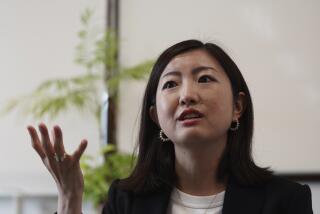FULLERTON : Japanese Women Study U.S. Feminism
- Share via
Thirty-three Japanese women got a two-day crash course in American feminism this week.
“In our city we are oppressed, but many people do not realize women are oppressed,” Kazuyo Tanaka said at a meeting at the Women’s Center at Cal State Fullerton. “Is there a strategy we can use?”
The visitors came from Fullerton’s sister city of Fukui in central Japan to ask advice on how to spread the women’s movement in Japan.
Tanaka, 41, said women in Japan are pressured to raise families, not work outside the home. Before taking maternity leave, her teaching salary was higher than her husband’s. Now she is expected to take care of her children and is only offered part-time positions, she said.
When Tanaka went back to study for a master’s degree in education six years ago, she met other women students who were fed up with the limitations on women. Now 10 women meet together and read books by authors like Betty Friedan, translated into Japanese.
Tanaka said many frustrations also translate well. “If you want a job in Japan, you’re still expected to do all the housework,” she said.
Tanaka publishes a newsletter for women called the Fukui Report, and is trying to persuade her husband to take her seriously, she said. “He doesn’t exactly know about feminism,” Tanaka said. “He’s a scientist.”
Barbara McDowell, coordinator of the Women’s Center, gave a 30-minute sketch of the achievements of the women’s movement in America. She explained that women play a greater role in the workplace and have more career opportunities than they used to.
“How do American men perceive American women?” asked Kyoko Nojo, 44, a psychotherapist. “Stereotypes are the hardest to die.”
McDowell began to explain to the translator that some men still perceive women simply as sex objects, and upon hearing the words sex objects , Nojo gave a knowing nod and frowned.
“Sometimes we say all men are jerks,” McDowell said.
“Jerks,” repeated Nojo, laughing.
“I don’t know how to translate that word,” said the translator to McDowell, but Nojo indicated that no translation was necessary.
Small groups of women, such as Tanaka’s, were the root of American feminism, McDowell said. “Women coming together and getting very, very honest with each other.”
McDowell also told the group about some of the challenges women in America still face, like the “glass ceiling”--the invisible barrier that many professional women say blocks their way to top management positions.
Tanaka said Fukui is a conservative city and women there are expected to fulfill roles as wife and mother before considering careers.
Women in the group told McDowell that they have problems getting job training and have difficulty re-entering the work force when they are older.
After their visit to the Women’s Center, they went to the Morningside senior care center to see how elderly people are cared for in this country. They also met with Molly McClanahan, congressional candidate and Fullerton city councilwoman, on Wednesday.
Though it was a brief trip, Blum said the Japanese women had planned it for years, and were serious about it as a learning opportunity.
More to Read
Sign up for Essential California
The most important California stories and recommendations in your inbox every morning.
You may occasionally receive promotional content from the Los Angeles Times.










